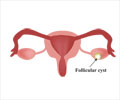Physicians and many women believe that a pelvic examination should be a part of annual well visits.

ACP's new evidence-based clinical practice guideline, "Screening Pelvic Examination in Adult Women," was published in Annals of Internal Medicine, ACP's flagship journal. ACP's guideline is based on a systematic review of the published literature on human subjects in the English language from 1946 through January 2014.
"Routine pelvic examination has not been shown to benefit asymptomatic, average risk, non-pregnant women. It rarely detects important disease and does not reduce mortality and is associated with discomfort for many women, false positive and negative examinations, and extra cost," said Dr. Linda Humphrey, a co-author of the guideline and a member of ACP's Clinical Practice Guidelines Committee. Dr. Humphrey notes that this guideline does not apply to Pap smear screening, only the pelvic examination.
ACP states that when screening for cervical cancer, the recommended examination should be limited to visual inspection of the cervix and cervical swabs for cancer and for some women human papillomavirus (HPV), and does not need to include the bimanual examination. ACP found that the diagnostic accuracy of the pelvic examination for detecting gynecologic cancer or infections is low. ACP advises that the pelvic examination is appropriate for women with symptoms such as vaginal discharge, abnormal bleeding, pain, urinary problems, or sexual dysfunction.
ACP's guideline includes High Value Care advice to help doctors and patients understand the benefits, harms, and costs of the pelvic examination so they can pursue care together that improves health, avoids harms, and eliminates wasteful practices.
"Screening pelvic examination exposes adult, asymptomatic, average risk, non-pregnant women to unnecessary and avoidable harms, including anxiety, embarrassment, and discomfort, and may even prevent some women from getting needed medical care," said Dr. Molly Cooke, ACP's Immediate Past President and a member of ACP's Clinical Practice Guidelines Committee. "False positive findings can lead to unnecessary tests or procedures, adding additional unnecessary costs to the health care system."
Advertisement
Source-Eurekalert











